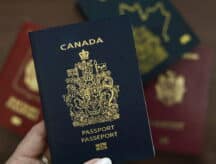Some temporary foreign workers can get a job in Canada without an LMIA thanks to these international agreements
Work permits given to foreign nationals in Canada can be broken down into two categories: those that require a Labour Market Impact Assessment (LMIA) and those that do not.
An LMIA is a document that some Canadian employers must obtain from Employment and Social Development Canada (ESDC) before they hire a temporary foreign worker (TFW). This document proves that the hiring of a TFW will only have a positive or neutral – that is, not negative – impact on the Canadian labour market.
Schedule a Free Work Permit Consultation with the Cohen Immigration Law Firm
Depending primarily on the positions they need to fill, Canada’s many international arrangements and agreements allow some employers to hire without an LMIA for TFWs from certain countries.
Occupation: Traders
Canadian employers hiring foreign nationals who work as traders can do so without an LMIA if the TFW is from any of the following six countries:
This is possible because of several international agreements Canada has with the above countries such as the Canada-United States-Mexico Agreement (CUSMA).
CUSMA, as a replacement for the North American Free Trade Agreement (NAFTA), allows American citizens to work in Canada without having to obtain a Temporary Resident Visa (TRV). Meanwhile, due to recent legislative changes, Mexican citizens looking to work in Canada must obtain a TRV as well, unless they meet all three of the criteria below, as outlined by Immigration, Refugees and Citizenship Canada (IRCC).
To enter Canada without a TRV, Mexican nationals must:
- Enter Canada by air or be flying to Canada to transit to another destination;
- Be coming to Canada for a short-term visit (usually for stays up to six months in length); and
- Have previously either:
- Held a Canadian visitor, work or student visa in the past 10 years, or
- Held a valid United States non-immigrant visa at the time of their application and travel
Who qualifies as a trader?
Generally, all of the above countries follow similar definitions as CUSMA regarding how they define someone working as a trader. Generally, a trader is someone who intends (and is able) to “engage in substantial trade of goods or services between Canada and their country of citizenship.”
Occupation: Investors
If the TFW is an investor from any of these nine countries/regions, Canadian employers can hire them without an LMIA:
- United States
- Mexico
- Colombia
- Chile
- South Korea
- Peru
- European Union (as part of the Canada-European Union Comprehensive Economic and Trade Agreement (CETA))
- United Kingdom
- Some Trans-Pacific Countries - as part of the Comprehensive and Progressive Agreement for Trans-Pacific Partnership (CPTPP)
Note: The six countries currently involved with the CPTPP are Canada, Australia, Japan, Mexico, New Zealand, and Singapore.
Who qualifies as an investor?
The general definition of an investor is shared (in line with CUSMA) among most countries that have a Free Trade Agreement (FTA) with Canada. Accordingly, an investor is generally defined as someone who can “demonstrate that [they have substantially invested] in a … Canadian business and that [they are coming to] Canada to develop and direct [this] business.”
Occupation: Professionals
TFWs from any of the following countries can be hired by a Canadian employer without an LMIA if they qualify as a professional:
- United States
- Mexico
- Colombia
- Chile
- Panama
- Peru
- GATS (General Agreement on Trade in Services) Member Nations
- Some Trans-Pacific countries as a result of CPTPP (same as the list in the investor section above)
Note: Click here for more information about GATS.
What is a “professional”?
Each of Canada’s FTAs defines a “professional” differently.
According to CUSMA, a professional is someone who either has “pre-arranged employment in Canada or a service contract with a Canadian company” to perform work “in an occupation that corresponds to their professional qualifications and with one of the eligible CUSMA professions.”
Intra-Company Transfers
Intra-Company Transfers (ICTs) are employees of foreign companies who are being transferred to work temporarily in Canada for a branch, subsidiary or affiliate of their employer.
Although ICT work permits are open to all countries, certain FTAs contain country-specific ICT provisions:
- Executives or Senior Managers: United Kingdom, CPTPP Member Nations, CETA Member Nations, Peru, South Korea, Chile, Colombia, United States, Mexico
- Specialized Knowledge: United Kingdom, CPTPP Member Nations, CETA Member Nations, Peru, South Korea, Chile, Colombia, United States, Mexico
- Management Trainees: United Kingdom, CPTPP Member Nations, Peru, South Korea, Colombia
- Graduate Trainees: CETA Member Nations
Other foreign nationals eligible for work in Canada without an LMIA
There are other situations where international agreements allow Canadian employers to hire certain foreign nationals from specific countries without an LMIA.
By occupation: Unique work situations
- Airline personnel (operational, technical and ground)
- Government personnel from the United States
By occupation: Technicians
- Colombia
- Panama
- Peru
- CPTPP Member Nations
By relationship status: Spouses
- Colombia
- South Korea
- CPTPP Member Nations
- European Union (CETA) – Spouses of ICTs
- United Kingdom – Spouses of ICTs
By country/agreement: Other
South Korea
- Contract service suppliers or independent professionals
European Union: CETA
- Contractual service suppliers
- Engineering technologists and Scientific technologists
- Independent professionals
United Kingdom
- Independent professionals
- Contractual service suppliers
- Engineering technologists and Scientific technologists
Schedule a Free Work Permit Consultation with the Cohen Immigration Law Firm
- Do you need Canadian immigration assistance? Contact the Contact Cohen Immigration Law firm by completing our form
- Send us your feedback or your non-legal assistance questions by emailing us at media@canadavisa.com







